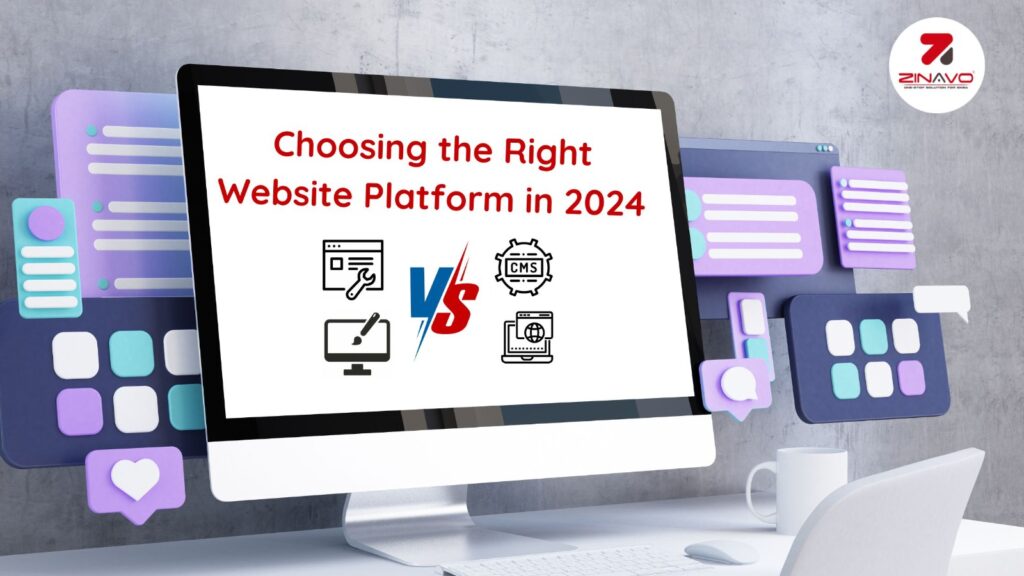Introduction
In the fast-paced digital landscape of 2024, selecting the right website platform plays a major role for establishing a strong online presence. With various options available, ranging from static websites to dynamic ones, Content Management Systems (CMS), and custom-built websites, making an informed decision is most important. In this guide, we’ll explore the key considerations for each type of website platform for web development and provide examples to help you choose the best fit for your needs.
1. Static Website:
A static website is simple, HTML-based online presence that doesn’t rely on server-side processing. It consists of fixed, pre-built web pages, delivering content exactly as it was designed. Static sites are cost-effective, easy to deploy, and boast quick loading times, making them ideal for personal portfolios, small businesses, or informational pages. With no server processing required for each user request, static websites offer heightened security. Platforms like GitHub Pages and Netlify simplify hosting, making static websites an efficient choice for those seeking simplicity and minimal maintenance overhead.
Example: Personal Portfolio Website
A personal portfolio website showcasing your work, achievements, and contact information can be effectively built using a static website. Tools like GitHub Pages or Netlify offer easy hosting for static sites.
2. Dynamic Website:
A dynamic website is a feature-rich online platform that utilizes server-side processing, offering interactive and personalized content. Unlike static sites, dynamic websites adapt and change based on user interactions, providing real-time updates and a dynamic user experience. Ideal for e-commerce, news portals, and sites requiring frequent content changes, dynamic websites often leverage databases to manage and deliver information. Popular platforms like Shopify and WooCommerce exemplify dynamic sites, enabling businesses to showcase products dynamically, process transactions, and engage users with content that evolves based on their preferences. Dynamic websites cater to the ever-changing demands of the modern online audience.
Example: E-commerce Website
An e-commerce site, like Shopify or WooCommerce, is a classic example of a dynamic website. These platforms enable you to manage product catalogs, process transactions, and provide a personalized shopping experience for customers.
3. CMS Website:
A CMS (Content Management System) website allows users to create, edit, and manage digital content without extensive technical knowledge. Offering a user-friendly interface, CMS platforms streamline content updates, making them ideal for businesses, bloggers, and organizations aiming for dynamic and regularly updated websites. WordPress, a popular CMS, facilitates seamless content publishing, customization through themes and plugins, and supports diverse media types. Its versatility and scalability make CMS websites a go-to choose for those seeking an adaptable, feature-rich solution that caters to evolving content needs without compromising ease of use.
Example: WordPress Website
WordPress is a widely-used CMS that powers a significant portion of the internet. It’s versatile, customizable, and supports a plethora of plugins, making it suitable for various types of websites, from blogs to business sites.
4. Custom Website:
A custom website is a digital solution crafted to meet specific business needs. Unlike template-based platforms, a custom website is designed and developed from scratch, offering unparalleled flexibility and uniqueness. This approach ensures that the site aligns precisely with the brand’s identity and functionality requirements. While it may involve a higher initial investment, the long-term benefits include scalability, optimal performance, and a personalized user experience. Custom websites are ideal for businesses with unique demands, providing the opportunity to integrate specialized features and maintain a competitive edge in the ever-evolving digital landscape.
Example: Enterprise Web Application
For large-scale businesses with complex needs, a custom-built web application can integrate multiple functionalities, such as customer relationship management (CRM), project management, and analytics. Platforms like Ruby on Rails or Django can be used for building such custom solutions.
Considerations for Choosing the Right Platform:
Scalability: Consider the potential growth of your website and choose a platform that can scale alongside your business.
Budget: Evaluate the costs associated with each platform, including hosting, domain registration, and additional features.
Ease of Use: Assess your technical proficiency and choose a platform that aligns with your comfort level.
Features and Flexibility: Identify the specific features your website requires and ensure the chosen platform can accommodate them.
Conclusion:
Selecting the optimal website platform in 2024 depends on your unique needs and goals and it is important for a successful online presence. The diverse landscape, featuring static, dynamic, CMS, and custom options, demands a careful evaluation of specific business needs, scalability, and budget considerations. Each platform offers distinct advantages, from the simplicity of static websites to the robust flexibility of custom solutions. By understanding these options and aligning them with your goals, you can make an informed decision that ensures not only a current but a future-proofed online presence. Choose wisely, considering factors such as scalability, ease of use, and the unique features your website demands for sustained success.
We hope that given blog information is useful. If you are still struggling to choose the right website platforms for your business, our expert will guide you from the scratch.
Web Developers in Bangalore | Website Development Company in Bangalore | Bangalore Website Design Company | Website Design in Bangalore



